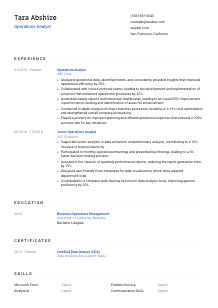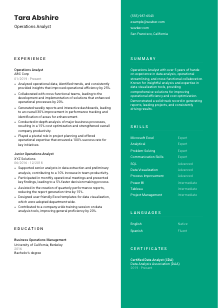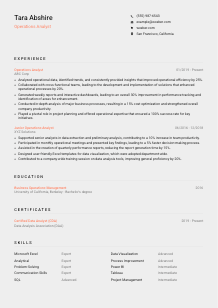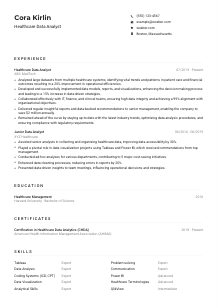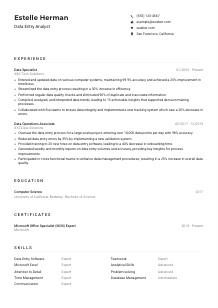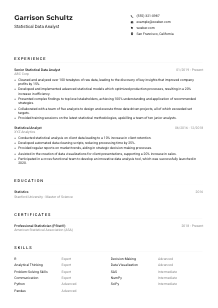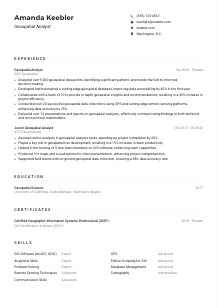Operations Analyst CV Example
Decoding workflows, but your CV is feeling like a loop? Navigate this Operations Analyst CV example, structured with Wozber free CV builder. Discover how to showcase your analytical maneuvers to align with job dynamics, setting your career compass for efficient, on-point trajectories!
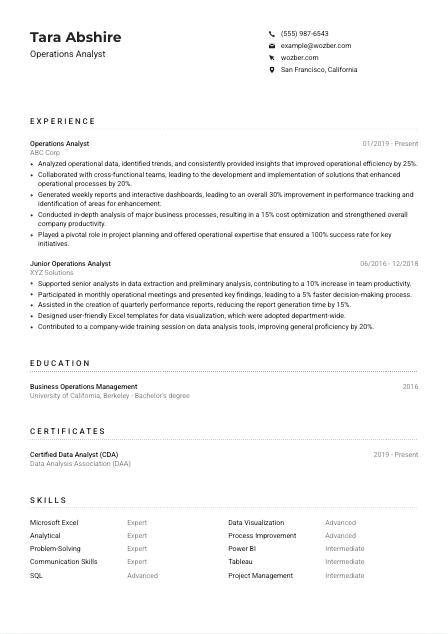
How to write an Operations Analyst CV?
Greetings, aspiring Operations Analyst! In a realm where deciphering data and otimizing operations is your call to adventure, your CV is the map that guides you to your career destination. With the precision of an analyst, you're about to embark on a mission to mold your CV into a beacon that shines brightly for hiring managers. Leveraging the power of Wozber's free CV builder, this guide is your secret formula to designing an ATS-compliant CV that speaks directly to the core of the Operations Analyst role.
Ready to unlock the door to your next career milestone? Let's delve into crafting a narrative that highlights your analytical prowess!
Personal Details
Dive into the gateway of your CV – the Personal Details section. This is where you make your first (and lasting) impression, combining accuracy with a tailored approach specifically designed for the Operations Analyst position.
1. Lead with Your Name
Ensure your name is a beacon, using a bold, readable font. Consider this the headline of your professional story, inviting the hiring manager to learn more about you.
2. Match the Job Title
Integrate the Operations Analyst title just beneath your name. This strategic placement instantly aligns your expertise with the role, signaling to the hiring manager that you're a perfect fit.
3. Essential Contact Information
- Phone Number: Accuracy is key; a typo here could mean a missed opportunity. Ensure it's a number where you're readily available.
- Professional Email Address: Maintain simplicity and professionalism. A format based on your name projects a polished image.
4. Location, Location, Location
Given the job's requirement for a San Francisco, CA location, specifying your San Francisco base preemptively ticks a box for logistical compatibility, streamlining the consideration process.
5. Professional Online Presence
If applicable, include a link to a professional profile. Ensure it mirrors your CV, offering a cohesive narrative of your professional journey.
Takeaway
Perfecting the Personal Details section sets a professional and aligned tone for your CV. It's your opportunity to make a meaningful first connection, ensuring every piece of information strategically positions you for the Operations Analyst role. Dot every "i" and cross every "t" – your attention to detail here foreshadows the quality of your analytical work.





Experience
Your Experience section is the crown jewels of your CV, showcasing your contributions and expertise in the operations realm. Let's sculpt this section with precision, ensuring it reflects your journey through the lens of an Operations Analyst.
- Analyzed operational data, identified trends, and consistently provided insights that improved operational efficiency by 25%.
- Collaborated with cross‑functional teams, leading to the development and implementation of solutions that enhanced operational processes by 20%.
- Generated weekly reports and interactive dashboards, leading to an overall 30% improvement in performance tracking and identification of areas for enhancement.
- Conducted in‑depth analysis of major business processes, resulting in a 15% cost optimisation and strengthened overall company productivity.
- Played a pivotal role in project planning and offered operational expertise that ensured a 100% success rate for key initiatives.
- Supported senior analysts in data extraction and preliminary analysis, contributing to a 10% increase in team productivity.
- Participated in monthly operational meetings and presented key findings, leading to a 5% faster decision‑making process.
- Assisted in the creation of quarterly performance reports, reducing the report generation time by 15%.
- Designed user‑friendly Excel templates for data visualization, which were adopted department‑wide.
- Contributed to a company‑wide training session on data analysis tools, improving general proficiency by 20%.
1. Dissect the Job Requirements
Begin your quest by dissecting each requirement of the job. For instance, "Analyze operational data, identify trends, and provide insights" should guide the crafting of your accomplishments.
2. Role and Company Framework
Frame your experience in a chronological order, starting from the most recent. Highlight your role, the organisation's name, and your tenure, laying out a clear timeline of your journey.
3. Tailor Achievement Statements
Construct your narratives around how you've propelled operational efficiency or led cross-functional projects, mirroring the responsibilities like those cited in the job description.
4. Quantify Your Impact
Whenever feasible, anchor your accomplishments with numbers. For example, "Improved operational efficiency by 25%" turns abstract achievements into measurable landmarks.
5. Relevance Is King
Prioritize experiences that resonate with the Operations Analyst role. Keep the focus sharp and aligned with the job's demands, letting peripheral achievements take a backseat.
Takeaway
The Experience section is your platform to showcase how you've already embodied the role of an Operations Analyst. Tailor each bullet point to reflect both your achievements and the future contributions you're poised to make. This isn't just a list; it's a strategic compilation of your professional narrative, underscoring your readiness and eagerness to excel in the new role.
Education
In the tapestry of your CV, the Education section signifies the foundation of your expertise. Here's how to weave your academic credentials into a compelling story that aligns with the Operations Analyst role.
1. Highlight the Required Degrees
Illuminate your Bachelor's degree in Business, Operations Management, or a related field, directly addressing the educational prerequisites mentioned in the job description.
2. Present with Clarity
Arrange your educational history in a straightforward manner, detailing your field of study, degree, institution, and graduation date. This clarity shows respect for the hiring manager's time and effort.
3. Degree Alignment
If your degree precisely matches the job's requirement, like a "Bachelor's degree in Business Operations Management," ensure it's front and center, unmistakably aligning your qualifications with the role's prerequisites.
4. Relevant Courses and Projects
Mention significant courses, projects, or thesis work that underscore your readiness for this role, especially if they directly relate to operational analytics or management.
5. Additional Achievements
Where applicable, showcase honors, clubs, or affiliations that fortify your candidacy, particularly if they demonstrate leadership or a commitment to the field of operations.
Takeaway
Your Education section isn't just a list of schools; it's a testament to your preparedness for the Operations Analyst role. By meticulously aligning your education with the job's demands, you signal not only compatibility but also a profound understanding of the role's foundation. This level of detail and attentiveness reflects the analytical mindset critical for the position.
Certificates
In the dynamically evolving operations field, certificates act as badges of honor, showcasing your commitment to continuous learning and mastery. Here's how to highlight your certifications in a way that amplifies your appeal for the Operations Analyst role.
1. Extract Relevant Certifications
While the job description may not explicitly require certifications, integrating relevant ones, such as a "Certified Data Analyst (CDA)," instantly elevates your profile.
2. Select with Purpose
Prioritize certificates that echo the job's skill requirements. This strategic selection underscores your targeted expertise and dedication to the field.
3. Date Matters
For certifications with expiry dates or those recently acquired, mention the period of validity. This transparency assures the hiring manager of your up-to-date knowledge.
4. Continuous Learning
Emphasize ongoing education through recent or in-progress certifications. This demonstrates a forward-thinking mindset, crucial for adapting to the evolving demands of operations analytics.
Takeaway
Every certificate you choose to include is a statement of your initiative, expertise, and foresight. This section is not just about ticking boxes but about showcasing a proactive stance towards personal and professional growth. By aligning your certifications with the demands of the Operations Analyst role, you present yourself as a candidate who not only meets but exceeds expectations.
Skills
The Skills section is your arsenal, equipped with tools essential for operational triumphs. Here's how to curate a collection of skills that resonates with the Operations Analyst role, making you an undeniable asset to potential employers.
1. Decode the Job Description
Analyze the job posting to identify both the stated and implied skills. Skills like "Microsoft Excel," "SQL," and "data visualization" aren't just requirements; they're your keywords for ATS optimisation.
2. Prioritize Pertinent Skills
List skills that mirror the job description, ensuring your proficiencies align directly with the role's needs. This direct correlation paints you as the ideal candidate.
3. Organisation Is Key
Strategically organize your skills, starting with the hard skills crucial for the job, followed by soft skills that showcase your adaptability and communication prowess. This structure provides a comprehensive view of your toolkit.
Takeaway
Consider your Skills section as an elevator pitch of your professional capabilities. It's a concise yet compelling snapshot of what you bring to the table, with each listed skill reinforcing your readiness for the Operations Analyst role. Approach it as an opportunity to signify your match not just through qualifications but through a shared language of competencies and aspirations.
Languages
In today's global operations environment, linguistic diversity can be a distinctive advantage. Here's how to weave your multilingual abilities into your CV in a way that accentuates your candidacy for the Operations Analyst role.
1. Language Requirements
Per the job description, "High proficiency in English necessary." Make sure this is visibly highlighted, directly catering to the specified need.
2. Spotlight Primary Languages
If English is your native or fluent language, ensure it's listed prominently. This fulfills a direct requirement and reassures the employer of your communication proficiency.
3. List Additional Languages
Additional languages should follow, with a clear indication of your proficiency level. This broadens your appeal, especially in roles with global interaction.
4. Honesty in Proficiency
Be transparent about your language skills, using terms like native, fluent, intermediate, and basic. This clarity provides an accurate expectation of your capability.
5. Consider the Role's Scope
For roles extending beyond local operations, showcasing additional languages can underscore your fit for the global dimension of the position.
Takeaway
Your multilingual skills do more than just fulfill communication requirements; they bridge cultures and markets, opening doors to diverse operational landscapes. Highlighting your language proficiencies, especially in alignment with the role's requirements and scope, positions you as a candidate with an expansive, world-ready toolkit.
Summary
The Summary section is your opening act, setting the stage for the detailed narrative that unfolds in your CV. This is where you distill your professional saga into a compelling prelude, captivating the hiring manager's attention right from the start.
1. Capture the Role's Essence
Dive deep into understanding the core requirements and responsibilities of the Operations Analyst role. Your summary should echo the language and needs of the job, demonstrating a bespoke fit.
2. Start with a Strong Introduction
Begin with a powerful statement summarizing your professional identity and core expertise areas. Position yourself not just as a candidate but as a solution.
3. Address Key Requirements
Weave into your summary key skills and achievements that directly respond to the job description. Highlight instances where your analytical endeavors led to tangible outcomes, providing a snapshot of your impact.
4. Conciseness Wins
While it's tempting to detail every success, remember, a summary is precisely that. Keep it tight, allowing your highlights to ignite interest in the deeper story within your CV.
Takeaway
Think of your Summary as the cover letter to your CV's novel. It's the first taste hiring managers get of your capabilities and impact. Tailored precisely to the Operations Analyst role, your summary should not only outline your qualifications but also manifest your readiness and enthusiasm for the challenges ahead. Make it irresistible, and let the narrative compel them to turn the page.
Embrace Your Operations Analyst Journey
Congratulations on meticulously navigating through the guide! Armed with these strategies, tips, and insights from Wozber's free CV builder, including free ATS-friendly CV templates and ATS optimisation with the ATS CV scanner, you're now fully equipped to craft an Operations Analyst CV that resonates authenticity, alignment, and ambition. Remember, every section of your CV is an opportunity to demonstrate your fit and flair for the role.
With each word and every detail, you're not just applying; you're inviting the hiring manager into your professional narrative. Forge ahead with confidence; your next big opportunity awaits!

- Bachelor's degree in Business, Operations Management, or related field.
- Minimum of 3 years of experience in data analysis, business operations, or similar roles.
- Proficiency in data analysis tools such as Microsoft Excel, SQL, and data visualization tools (e.g., Power BI, Tableau).
- Strong analytical, problem-solving, and communication skills.
- Demonstrated ability to work in a fast-paced environment and handle multiple projects simultaneously.
- High proficiency in English necessary.
- Must be located in San Francisco, CA.
- Analyze operational data, identify trends, and provide insights to improve operational efficiency.
- Collaborate with cross-functional teams to develop and implement solutions for operational enhancements.
- Generate regular reports and dashboards to track performance metrics and identify areas of improvement.
- Conduct in-depth analysis of business processes to determine potential weaknesses or areas for cost optimization.
- Participate in project planning and provide operational expertise to ensure successful implementation of key initiatives.





